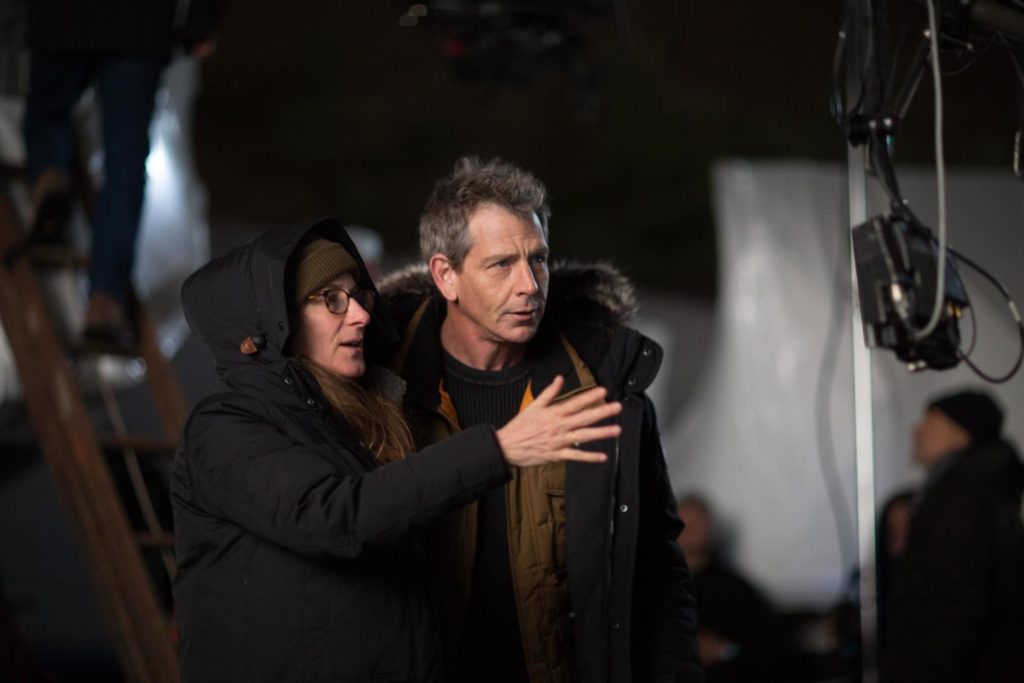Nicole Holofcener has written and directed six feature films including “Enough Said”and “Friends with Money.” She also co-wrote Marielle Heller’s “Can You Ever Forgive Me?,” starring Melissa McCarthy, which hits theaters in October. She has directed episodes of numerous television shows including “Togetherness,” “Orange Is the New Black,” “Enlightened,” and most recently the HBO pilot based on Tom Perotta’s novel “Mrs. Fletcher.”
“The Land of Steady Habits” will begin screening at the 2018 Toronto International Film Festival on September 12. The film will debut on Netflix on September 14.
W&H: Describe the film for us in your own words.
NH: “The Land of Steady Habits” is about a man named Anders Hill (Ben Mendelsohn) who struggles with his floundering son and the foolish choices he makes, all the while trying to find meaning in his own life. Anders leaves his job and his wife (Edie Falco), and can’t help but to be angry, lonely, and generally rude to the people he cares about.
He knows that he doesn’t belong in the stodgy community of Westport, Connecticut, but doesn’t know where he could belong. This draws Anders toward reckless, regrettable behaviors that ultimately result in a tragic ending.
W&H: What drew you to this story?
NH: I initially loved reading about a world I knew nothing about– the precious enclave of Westport and some of the repressed people who lived in it. Men really wear shorts with little whales on them? Let me in! The movie is very much about fathers and sons, and I am generally intrigued by family dynamics.
I would never come up with this story, or thought I would be drawn to its upsetting themes, but for some reason, I was completely hooked. The book had great scenes that I couldn’t wait to shoot, which is usually a sign that I want to get involved in a project.
W&H: What do you want people to think about when they are leaving the theater?
NH: I hope they feel emotional, connected to humanity, changed, inspired, and not too miserable. Seriously, it’s sad. But it’s worth it!
W&H: What was the biggest challenge in making the film?
NH: The biggest challenge was time. It’s always time, and not having enough of it. The shoot was for 26 days –the longest I’ve ever had –and I would have liked just a few more. The Christmas Eve dinner scene could definitely have benefited from an extra day. I wanted more coverage because it’s such a pivotal scene, but I think it turned out pretty well.
W&H: How did you get your film funded? Share some insights into how you got the film made.
NH: My film was funded by Netflix.
W&H: What inspired you to become a filmmaker?
NH: Who really knows? I found that I liked writing and when I had the opportunity to try directing, I felt that I was in the right place. I always loved to tell stories as a kid, and because I loved movies so much, it seemed like it could be a good fit.
W&H: What’s the best and worst advice you’ve received?
NH: The worst advice I received was from an agent who said I should give up writing, and maybe just become a director. I had given him a script to read and that was his cruel response.
The best advice came from Jim Jarmusch, when I was volunteering at the New York Film Festival. His movie “Mystery Train” had blown me away, so I mustered the courage to ask him for advice in the green room. In his beautiful deadpan way, he said “don’t give up.” I thought it was profound.
W&H: What advice do you have for other female directors?
NH: Don’t give up.
W&H: Name your favorite woman-directed film and why.
NH: Claudia Weill’s “Girlfriends”; Joyce Chopra’s “Smooth Talk”; Jane Campion’s “The Piano” and “Sweetie”; Catherine Hardwicke’s “Thirteen”; Patty Jenkins’ “Monster”; Lynne Ramsay’s “Ratcatcher”; Dee Rees’ “Pariah”; Amy Heckerling’s “Fast Times at Ridgemont High”; Susan Seidelman’s “Desperately Seeking Susan”; Randa Haines’ “Children of a Lesser God”; Patricia Rozema’s “I’ve Heard the Mermaids Singing”; Andrea Arnold’s “Fish Tank”; Lina Wertmüller’s “Seven Beauties”; Nancy Savoca’s “Dogfight”; Kimberly Peirce’s “Boys Don’t Cry;” Valerie Faris and Jonathan Dayton’s “Little Miss Sunshine”; Tamara Jenkins’s “The Slums of Beverly Hills”; Debra Granik’s “Winter’s Bone”; Deniz Gamze Ergüven’s “Mustang”;Dorota Kobiela and Hugh Welchman’s “Loving Vincent.”
I’m sure there are more. Sorry, did you say just one?
W&H: Hollywood and the global film industry are in the midst of undergoing a major transformation. What differences have you noticed since the #MeToo and #TimesUp movements launched?
NH: I think the #MeToo and #TimesUp movements have forced studios to consider hiring more women because we’re shaming them into doing so–and that’s great. I wish it didn’t have to be that way, but whatever works. The numbers are still so awful. It’s depressing.







